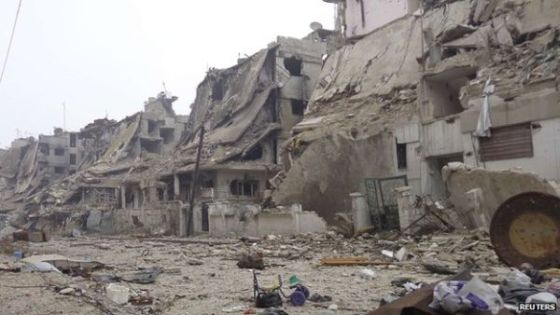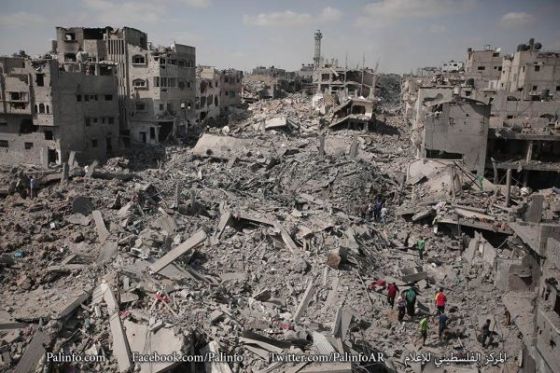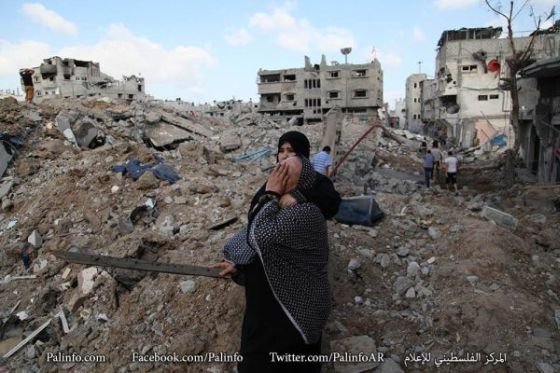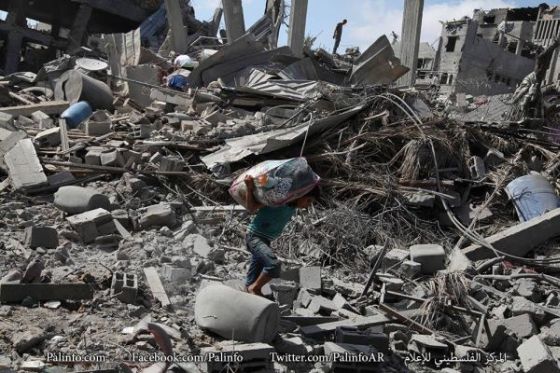For years, the Israeli Defense Forces have been aware of the construction of tunnels from Gaza into Israel, it has known where these are located and it has done nothing.
We hear a lot about Israel’s right to defend itself but what about its responsibilities when defending itself?
I refer not simply to the glaringly obvious responsibility of proportionality in the use of violence, but also the responsibility to take prudent steps to avoid conflict in the first place.
Specifically, since Israel asserts that tunnels from Gaza pose a strategic threat, why has it done so little in the past to prevent these tunnels from being constructed, made such feeble attempts to locate those that exist, and left in place tunnels it already identified?
Israelis frequently assert “we have no choice” when justifying the slaughter of hundreds of innocent people, yet those who are attached to victimhood invariably do this: use the cloak of necessity to cover up their own bad choices.
In reality, Israel rarely lacks the opportunity to make choices; what it lacks is sound judgement.
The latest chapter in Israel’s long narrative — casting itself once again as a victim of necessity — is the current campaign in Gaza whose ostensible purpose is to destroy the “infrastructure” of Hamas’s “terror tunnels.”
Prime Minister Benjamin Netanyahu says: “We will not complete the operation without neutralizing the tunnels, the sole purpose of which is the destruction of our civilians and the killing of our children,” reports the New York Times. “It cannot be that the citizens of the state of Israel will live under the deadly threats of missiles and infiltration through tunnels — death from above and death from below.”
The paper goes on to describe how Israelis are now held captive by their fear of the terror tunnels:
In cafes and playgrounds, on social-media sites and in the privacy of pillow talk, Israelis exchange nightmare scenarios that are the stuff of action movies: armed enemies popping up under a day care center or dining room, spraying a crowd with a machine gun fire or maybe some chemical, exploding a suicide belt or snatching captives and ducking back into the dirt.
“It takes us a little bit to our childhood fairy tales of demons,” said Eyal Brandeis, 50, a political scientist who lives on Kibbutz Sufa, a mile from where 13 militants emerged from a tunnel at dawn July 17. “It’s a very pastoral environment I live in, the quiet, the green grass, the trees. It’s not a pleasant thought that you sit one day on the patio drinking coffee with your wife and a bunch of terrorists will rise from the ground.”
Devils who emerge from the bowels of the earth — their sole intention being to kill or kidnap Israelis. There cannot be any doubt that the Israeli government, like any other, would do everything in its power to protect its citizens from such an awful threat.
Yet Israel bombs Gaza now because in the past it did so little to address this issue.
Either the magnitude of the threat has in recent days been wildly exaggerated, or the IDF is guilty of gross negligence.
(Just to be clear, while the current war on Gaza began in the name of halting rocket attacks, it is now squarely focused on tunnel destruction. This is the justification being used for flattening whole neighborhoods.)
The Israeli journalist Shlomi Eldar reported yesterday:
In an interview with Al-Monitor, Efraim Barel, a resident of Nirim village, said that the residents of villages the length of the border with Gaza not only heard and sensed the excavations underway beneath their homes, but even uncovered tunnels in their areas. According to Barel and others, the IDF did nothing about it.
“For years, the residents heard noises,” Barel said. “One Friday, I was lying on the couch and heard loud knocking, boom-boom-boom. I really felt it from under the sofa. My dog started to bark, to go crazy. The army came. They were by me under the house for three days. They asked questions, brought all kinds of instruments to hear noises, and that was the end of it. Later on, there was flooding in the area and then one of the tunnels was exposed. Evidently, that was the tunnel I had heard being dug under my house.”
That the subsoil of this area is well suited to tunneling has been known since Alexander the Great’s siege of Gaza in 332 BC. But unlike the protagonists of that era, Israel has access to technology capable of finding existing tunnels and detecting those under construction — although the narrative of necessity is still being promoted through reporting such as this in Haaretz on July 17:
The IDF has tried almost every possible technological solution in its attempt to find tunnels. They have used geologists, experts in the search for oil and gas, and U.S. Army personnel, but so far no guaranteed solution has been found.
A report in the same newspaper a week later undermines this claim.
Even after the Israeli soldier Gilad Shalit was captured in a Hamas raid in 2006 and taken back to Gaza through a tunnel, Israel failed to take responsibility for its own defense by preventing new tunnels being constructed and failed to locate and destroy existing tunnels. The means to accomplish both of those goals have long been available and would cost relatively little to implement.
Israel’s failure to shut down the tunnels may even suggest that this was not the result of negligence. On the contrary, by allowing the tunnels to remain in place, Israel’s political and military leadership may have made a conscious choice to retain a pretext for renewed attacks on Gaza — a pretext that could be deployed whenever it suited Israel’s purposes.
How could Israel have addressed this issue before now? Haaretz reports:
There are three main types of technology for locating tunnels; the most common is based on listening for digging. In 2009, scientists at the Technion technology institute’s Faculty of Civil and Environmental Engineering presented a method for identifying tunnels using a fiber-optic cable.
The Technion’s Assaf Klar and Raphael Linker say the system can even locate narrow tunnels more than 60 feet (18 meters) deep while keeping a lid on false alarms.
“Tunnel excavation is accompanied by the release of stresses that cause permanent — though very tiny — displacements and strains in the ground,” Klar says. “If you can measure these strains in the soil with sensitive equipment, you can find a tunnel’s location.” Tunnel excavation produces a very distinctive signal, he adds.
The research lays the groundwork for an underground fence based on existing technology called BOTDR — Brillouin optical time domain reflectometry. This makes it possible to measure fiber distortion along 30 kilometers using a single device and a standard fiber-optic cable — a cable that costs only a few shekels a meter.
The system is based on so-called wavelet decomposition of the BOTDR signal, a process that breaks down the signal into simpler shapes and filters out irrelevant noise. The signals that remain are then classified by a network that locates tunnels using the computer simulation of tens of thousands of profiles, including disturbances not related to tunneling; for example, raindrops.
“The ability of the BOTDR approach to supply a continuous profile of soil distortions along the fiber-optic line — and the ability of the neural network to identify the relevant profile — are the keys to the system’s success,” Linker says.
In recent days, geology experts have made their own claims; they say technologies indeed exist to locate the tunnels, it’s just that the IDF hasn’t adopted them. “It’s not a challenge and it’s not difficult; solutions are already at hand,” says Dov Frimerman, the former geologist at the Public Works Department.
Frimerman was one of the geologists behind the research into the sinkholes near the Dead Sea. He describes another method for locating underground spaces via radar, which he used to find sinkholes at the Dead Sea.
“If I drive a car or armored personnel carrier with underground radar attached, technically there’s no tunnel I can’t identify up to 10 meters deep,” he says. “You can go over the entire border at 5 kilometers an hour and within three hours mark every tunnel.”
The radar sends electromagnetic waves into the ground and creates a picture of the soil layers — “for example, if there’s a fault. That’s how we found the [hollow] spaces under the parking lot of what was the resort village at Ein Gedi,” Frimerman says.
This American-made radar is relatively simple to use. Frimerman notes that even Hamas’ tunnels more than 10 meters deep can be found by this method when the tunnels slope up into Israeli territory. Also, sealed- and concrete-walled tunnels can be identified this way.
A third method for locating tunnels more than 10 meters deep is microgravimetry, which measures very small variations in gravity.
“The level of precision of this test is in parts of a billion, so there’s no hole or space in the ground up to 100 to 150 meters that can’t be identified with it,” Frimerman says. The equipment was originally developed by NASA and was used to test gravity variations to determine the distribution of minerals in the ground.
The method for locating tunnels by listening for sounds underground is called geo-seismology. It’s based on the use of microphones as underground sensors.
“When you don’t know if there are tunnels you can dig two pits 10 centimeters in diameter and 10 meters deep. You place microphones there, which cost $80 to $100 each, and connect them to equipment that costs $2,500. It’s impossible to reach a distance 100 meters from the microphones without hearing movement in the headphones,” Frimerman says.
“If the tunnel is ready, you can hear whoever is walking in it; you can distinguish between the steps of a person and the steps of a fox, for example. It’s impossible to dig at a distance of 100 to 150 meters from the microphones without noticing the digging.”
For a relatively low price the IDF could spread microphones 100 meters apart and cover the entire Gaza border, Frimerman says. If the position where soldier Gilad Shalit was abducted in 2006 had two microphones near the fence 100 meters apart, no one could have walked through the tunnel without being heard, he adds.
“The technology exists; it’s not clear why they aren’t using it,” he says. “We proposed it 30 years ago.”
Frimerman’s claims are also backed up by one of Israel’s best known geologists, Col. (res.) Yossi Langotsky, the man behind Israel’s massive oil-and-gas discoveries off the coast. He also set up Military Intelligence’s special-operations division and is a two-time winner of the Israel Defense Prize.
The IDF characterizes its current operation as both proactive and defensive: “We’re not willing for [Hamas] to come and meet us in our backyard,” says IDF spokesman Peter Lerner. “We want to meet them in theirs.”
But Israel has been aware of tunnel construction since 2003 and contrary to the IDF spokesman’s claim seems to have been quite content to face Hamas in its backyard. Indeed, one might wonder whether aside from the political value tunnels offer to Israel in providing a ready-made pretext for attacking Gaza at any time, Israel’s unwillingness to prevent tunnel construction may say as much about a more visceral objection: why go to the expense of digging up your own land and installing a network of sensors, when instead you can bomb Gaza, teach Hamas a lesson and show the Palestinians you’re still the boss?
The “terror tunnels” pose less of a threat to Israel than they serve as yet another excuse to ruthlessly bludgeon the residents of Gaza.





